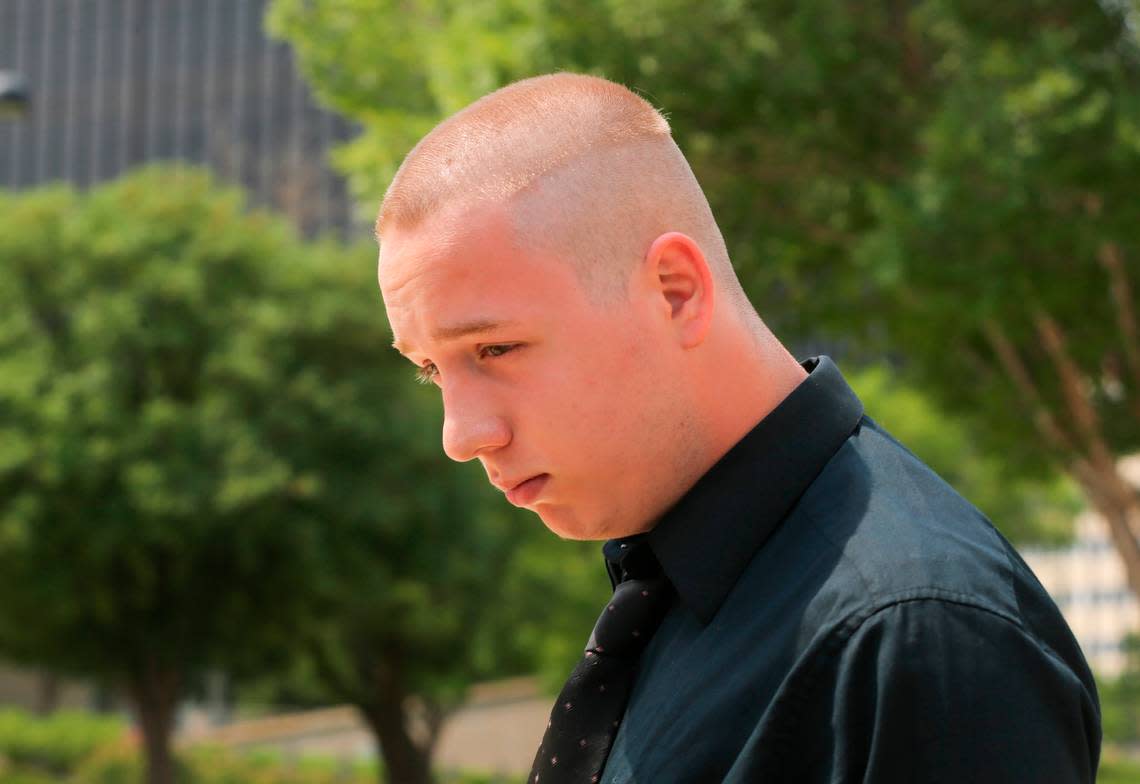No probation for Wichita gamer involved in deadly swatting; judge orders prison instead
A 23-year-old Wichita man will spend 18 months in prison for his role in a deadly hoax emergency call that resulted in police killing an innocent man on his front porch in 2017, capping prosecutions in what’s thought to be the first deadly “swatting” case in history.
The swatting left 28-year-old father of two Andrew Finch dead on Dec. 28, 2017, from a gunshot fired by a Wichita police officer among law enforcement responding to what was later deemed a false report about a homicide and active hostage situation at 1033 W. McCormick in Wichita.
Shane Gaskill, who admitted to giving his old address to a fellow online gamer who recruited a serial hoaxer to harass him following a fight, was sentenced Monday in federal court — months after prosecutors pulled their support for a previously negotiated diversion plan. Had Gaskill successfully completed the diversion program, prosecutors would have dismissed his charges, resulting in the most lenient sentence of the three men charged in the case.
But in May, with that option off the table after he reportedly violated his diversion terms, Gaskill pleaded guilty to a single count of wire fraud.
The other men involved in the swatting, Tyler Barriss of California and Casey Viner of Ohio, both received prison sentences.
Barriss is still serving 20 years after pleading guilty in 2019 to 51 counts associated with the Wichita and other hoax emergency calls around the U.S., including at the FBI and the Federal Communications Commission headquarters in Washington, D.C. Now 29, he is housed at FCI Phoenix, a medium-security federal correctional institution in Arizona. The Federal Bureau of Prisons’ inmate locator lists his release date as Jan. 14, 2035.
Viner, 22, was sentenced to 15 months in September 2019 after pleading guilty to counts of conspiracy and obstruction of justice. He is scheduled to complete two years of supervised release in November, court records indicate.
U.S. District Judge Eric Melgren handed down the 18-month sentence, according to court records and Danielle Thomas, a spokeswoman for the U.S. Attorney’s Office for the District of Kansas. Melgren also ordered Gaskill pay $2,500 in restitution to the Kansas Crime Victim’s Compensation Fund, which helps violent crime victims and their families pay for medical bills, lost wages and funeral and other costs.
Gaskill had asked to be placed on probation. In a typed sentencing memorandum submitted to the court last week, his lawyer argued the 23-year-old’s conduct in 2017 was “wildly out of character,” that he had only traffic infractions on his record before the swatting and had turned to online gaming to cope with a lack of social interaction after dropping out of high school as a sophomore.

Gaskill, the lawyer added, no longer participates in online gaming, received a GED and had been employed with the hope of one day joining the military or attending technical school.
Swatting is a common form of online taunting where a person reports a fake emergency serious enough to draw a law enforcement response — especially a special weapons and tactics, or SWAT, team — to the address of an individual they want to embarrass or harass. It has gained traction among online gamers in recent years.
Justin Rapp, the Wichita police officer who killed Finch, did not face criminal charges but was sued by Finch’s family in civil court. He has since been promoted to detective by the Wichita Police Department, despite making a comment to a supervising officer that he would tell Finch’s mother to “get over it” if he ever ran into her, according to an August report by The Eagle. He was previously denied a promotion because of that and other apparently inflammatory comments he reportedly made in the aftermath of Finch’s fatal shooting.
In his May plea agreement, Gaskill admitted to giving the 1033 W. McCormick address to Viner during a spat over a Call of Duty World War II wager match worth $1.50. Believing the address was current, Viner turned it over to Barriss, who phoned emergency dispatchers in Wichita with a bogus tale about how he’d murdered his father, was holding his mother and sibling at gunpoint and might set his house on fire.
Barriss, police later discovered, made the call from California. But not before Rapp shot Finch after Finch stepping onto his front porch to find the source of flashing police lights outside of the house. Police claim Finch failed to follow orders to keep his hands raised and reached toward his waistline. Rapp fired from across the street.
After hearing about the fatal shooting, Gaskill deleted his message threads with Viner and Barriss and told them to do the same to cover up their involvement, according to his plea agreement.
Finch was not involved in the online fight, did not know any of the men prosecuted and did not play online video games, his family and police have said.
Gaskill has asked that he be imprisoned at a penitentiary close to his family in Kansas so they can visit, court records show. He will be supervised for three years after he is released and is prohibited from contacting Finch’s family and from participating in any form of online gaming.
